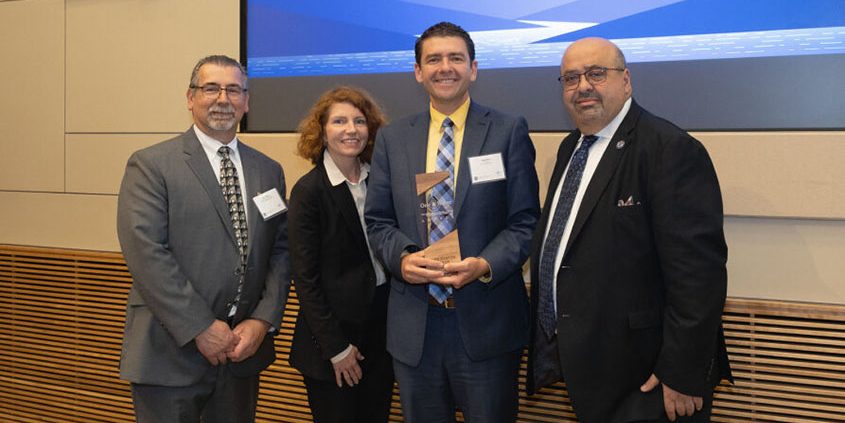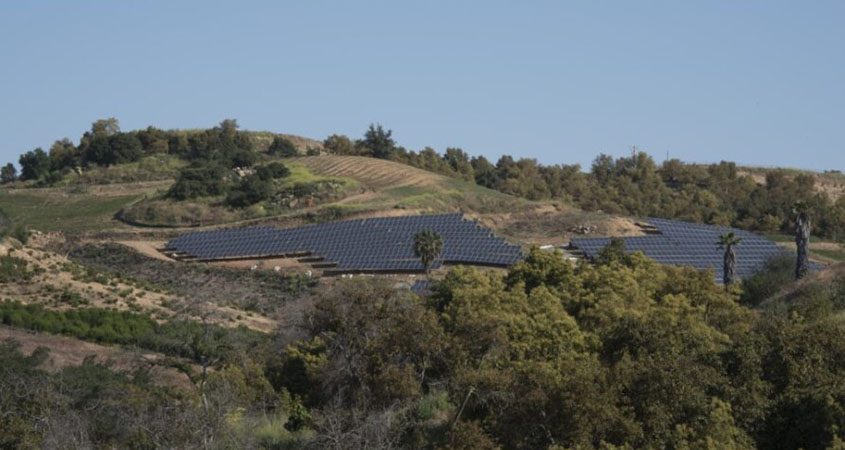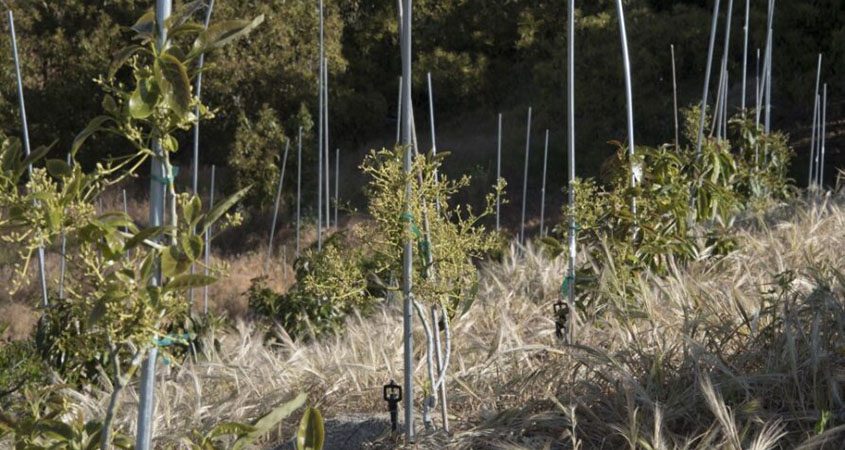 Fallbrook avocado farmer Josh Kane (3rd from left) receives One Water award for WaterSmart moves on Rice Canyon Ranch. Photo: Metropolitan Water District of Southern California
Fallbrook avocado farmer Josh Kane (3rd from left) receives One Water award for WaterSmart moves on Rice Canyon Ranch. Photo: Metropolitan Water District of Southern CaliforniaWaterSmart Moves Pay Off for Fallbrook Avocado Farm
Josh Kane didn’t know a lot about avocado farming 10 years ago, but he does now.
In 2001, Kane’s mother bought a 60-acre avocado farm, the Rice Canyon Ranch, in Fallbrook, thinking it would be a good investment. But, some not-so-good advice, and the 2014 drought, had the business in a nosedive.
So, Kane quit his job in commercial real estate and stepped in to help his mom turn the farm around, or “they would have lost the investment,” said Kane.
During that time, the Fallbrook area had been a hub for agriculture, specifically avocados. But many farms ceased operating due to a complex suite of factors that include increasing water and labor costs, competition from imports, and climate volatility.
Rice Canyon took a long-term investment perspective and invested in innovative measures, including tree stumping and grafting. Those strategies, along with smart irrigation, helped turn the farm around. But challenges remain.
Award-winning water-use efficiency
The Metropolitan Water District of Southern California Water Savings Incentive Program, or WSIP, helped Kane to increase water-use efficiency at the farm. Rice Canyon Ranch and Kane were recognized with an award. He was one of six honorees selected based on their remarkable water-saving projects and facility upgrades funded by the WSIP.
Each unique project was recognized in a May 2023 ceremony for its technological innovations, environmental stewardship and water sustainability.
Metropolitan’s One Water Awards ceremony at the California Endowment in Los Angeles honored organizations that used funding from the WSIP to make major improvements to their water management operations and equipment, such as installing smart irrigation technology, water recirculation systems and soil moisture sensors.

The Rice Canyon Ranch avocado farm. Photo: Metropolitan Water District of Southern California
Long-term sustainable change
“The transformation of daily operations for these organizations translates into long-term, sustainable change for entire communities,” said Metropolitan General Manager Adel Hagekhalil. “The ceremony demonstrated that when everyone does what they can to use less water, we produce real water savings that benefits millions.”
Named for Metropolitan’s approach to water management that values and acknowledges that all water resources are connected, the One Water Awards program amplifies the success of participants in its WSIP. The program provides funding to commercial, industrial, institutional and agricultural customers that make water efficiency upgrades to their facilities but may not qualify for Metropolitan’s standard commercial rebate programs. It pays up to $0.60 per 1,000 gallons of water saved annually through customized projects that are developed by each organization to fit its needs.
“Outside of the box” strategies for avocado farm
The WSIP program and incentives were critical to implementing Rice Canyon’s strategies and have helped significantly reduce costs.
Rice Canyon replaced existing, or old trees, with “high-density planting.” How did removing old trees and high-density planting save water and money?
Kane says Haas avocado trees reach up to “40 feet and out 50 feet, it’s a massive tree and older trees would climb higher and higher in the old way of growing.”
Instead of planting trees like the typical spacing for avocado farms in the past, the new trees were planted on 10 feet by 10 feet spacing. Kane says that change to smaller spacing allowed reduced water usage, reduced loss due to deep percolation, inhibited weed growth, and excessive evaporation loss through overgrown canopies. Plant “material changes” meant using mulch to save water.
“Avocado roots are only about six inches deep, so they require a lot of water,” Kane explained. “But adding a layer of mulch keeps the roots wet, reducing irrigation and saving water.”

The 60-acre Rice Canyon Ranch avocado farm is supplied with water from the San Diego County Water Authority and the Rainbow Municipal Water District, one of the Water Authority’s 24 member agencies. Photo: Metropolitan Water District of Southern California
Tree spacing to save water
“With the fruits on the canopy – and all the water needed to pull the water up to the canopy – a 9-foot-tall tree, cutting and pruning it back, is more efficient with the sun, space and way more efficient with the water,” said Kane.
Kane says before the changes in tree spacing, use of mulch, and smart irrigation, the water costs for the avocado farm were about $250,000 a year.
“Our water costs are about $62,000 a year now, a cut of roughly 75-percent, which is huge,” Kane said.
He said the farm received $238,000 from the WSIP program for the water-efficiency project and the operation now saves about 34-38 million gallons of water a year. Kane says the 10-year projected water savings is 350 million gallons.
Even with the grant, and all the changes to the farm – including smart irrigation techniques, Kane says competition from outside the U.S. is a big factor in making a profit.
“We’re giving it a go and trying, but the price per pound – with competition from a lot of overseas fruit, from Mexico, Argentina, Peru – is a key factor for us,” said Kane.
WaterSmart advice for growers
“Farming is not easy by any means,” said Kane. “The price we get for our avocados is about the same per pound today as we got 10 years ago. There are no guarantees, but the way we had to make it work was to reduce water expenses as much as we could.”
Kane has this advice to remain profitable for other growers of avocados or similar crops for smart irrigation.
“You have to think outside the box to make it, decrease expenses and increase profits – never stop learning,” said Kane. “Any old time farmer growing avocados the same way as 40 years ago, must change and adapt with the times.”
He says despite the water cost savings, use of water sensors and other changes, growing avocados for Rice Canyon is a tough business.
“It is a labor of love, not a business of income, but the water grant gets us closer to making it work,” said Kane.
(Editor’s Note: The Metropolitan Water District of Southern California is a water wholesaler. Since 1990, Metropolitan has invested nearly $1 billion in conservation programs, saving about 3.5 million acre-feet of water. Rice Canyon Ranch is supplied with water from the San Diego County Water Authority and the Rainbow Municipal Water District, one of the Water Authority’s 24 member agencies.)


